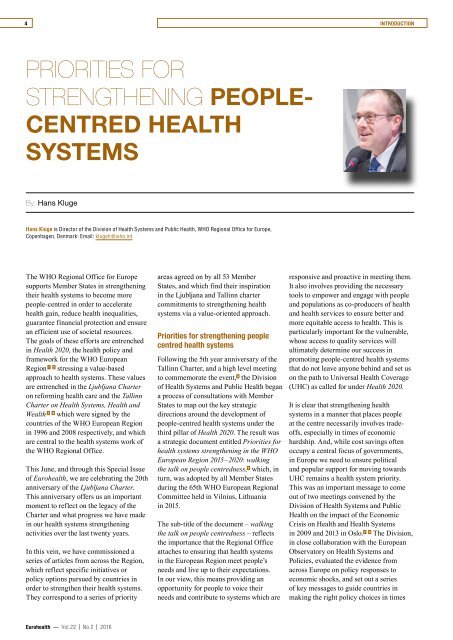EUROHEALTH
Eurohealth-volume22-number2-2016
Eurohealth-volume22-number2-2016
Create successful ePaper yourself
Turn your PDF publications into a flip-book with our unique Google optimized e-Paper software.
4<br />
INTRODUCTION<br />
PRIORITIES FOR<br />
STRENGTHENING PEOPLE-<br />
CENTRED HEALTH<br />
SYSTEMS<br />
By: Hans Kluge<br />
Hans Kluge is Director of the Division of Health Systems and Public Health, WHO Regional Office for Europe,<br />
Copenhagen, Denmark: Email: klugeh@who.int<br />
The WHO Regional Office for Europe<br />
supports Member States in strengthening<br />
their health systems to become more<br />
people-centred in order to accelerate<br />
health gain, reduce health inequalities,<br />
guarantee financial protection and ensure<br />
an efficient use of societal resources.<br />
The goals of these efforts are entrenched<br />
in Health 2020, the health policy and<br />
framework for the WHO European<br />
Region 1 2 stressing a value-based<br />
approach to health systems. These values<br />
are entrenched in the Ljubljana Charter<br />
on reforming health care and the Tallinn<br />
Charter on Health Systems, Health and<br />
Wealth 3 4 which were signed by the<br />
countries of the WHO European Region<br />
in 1996 and 2008 respectively, and which<br />
are central to the health systems work of<br />
the WHO Regional Office.<br />
This June, and through this Special Issue<br />
of Eurohealth, we are celebrating the 20th<br />
anniversary of the Ljubljana Charter.<br />
This anniversary offers us an important<br />
moment to reflect on the legacy of the<br />
Charter and what progress we have made<br />
in our health systems strengthening<br />
activities over the last twenty years.<br />
In this vein, we have commissioned a<br />
series of articles from across the Region,<br />
which reflect specific initiatives or<br />
policy options pursued by countries in<br />
order to strengthen their health systems.<br />
They correspond to a series of priority<br />
areas agreed on by all 53 Member<br />
States, and which find their inspiration<br />
in the Ljubljana and Tallinn charter<br />
commitments to strengthening health<br />
systems via a value-oriented approach.<br />
Priorities for strengthening people<br />
centred health systems<br />
Following the 5th year anniversary of the<br />
Tallinn Charter, and a high level meeting<br />
to commemorate the event, 5 the Division<br />
of Health Systems and Public Health began<br />
a process of consultations with Member<br />
States to map out the key strategic<br />
directions around the development of<br />
people-centred health systems under the<br />
third pillar of Health 2020. The result was<br />
a strategic document entitled Priorities for<br />
health systems strengthening in the WHO<br />
European Region 2015 – 2020: walking<br />
the talk on people centredness, 6 which, in<br />
turn, was adopted by all Member States<br />
during the 65th WHO European Regional<br />
Committee held in Vilnius, Lithuania<br />
in 2015.<br />
The sub-title of the document – walking<br />
the talk on people centredness – reflects<br />
the importance that the Regional Office<br />
attaches to ensuring that health systems<br />
in the European Region meet people’s<br />
needs and live up to their expectations.<br />
In our view, this means providing an<br />
opportunity for people to voice their<br />
needs and contribute to systems which are<br />
responsive and proactive in meeting them.<br />
It also involves providing the necessary<br />
tools to empower and engage with people<br />
and populations as co-producers of health<br />
and health services to ensure better and<br />
more equitable access to health. This is<br />
particularly important for the vulnerable,<br />
whose access to quality services will<br />
ultimately determine our success in<br />
promoting people-centred health systems<br />
that do not leave anyone behind and set us<br />
on the path to Universal Health Coverage<br />
(UHC) as called for under Health 2020.<br />
It is clear that strengthening health<br />
systems in a manner that places people<br />
at the centre necessarily involves tradeoffs,<br />
especially in times of economic<br />
hardship. And, while cost savings often<br />
occupy a central focus of governments,<br />
in Europe we need to ensure political<br />
and popular support for moving towards<br />
UHC remains a health system priority.<br />
This was an important message to come<br />
out of two meetings convened by the<br />
Division of Health Systems and Public<br />
Health on the impact of the Economic<br />
Crisis on Health and Health Systems<br />
in 2009 and 2013 in Oslo. 7 8 The Division,<br />
in close collaboration with the European<br />
Observatory on Health Systems and<br />
Policies, evaluated the evidence from<br />
across Europe on policy responses to<br />
economic shocks, and set out a series<br />
of key messages to guide countries in<br />
making the right policy choices in times<br />
Eurohealth — Vol.22 | No.2 | 2016
















